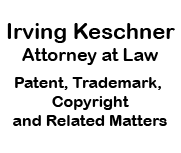Four areas of Protection
An individual or business entity may have proprietary rights which it desires to protect against use by a third party. State and Federal case law recognizes four areas of protection:
Patent - a grant by the U.S. Government to an inventor of the the right to exclude others from making, using or selling any new and useful process, machine, manufacture or composition of matter, or any new and useful improvements thereon. The duration of the grant is 20 years from the application filing date.
Trademark / Service Mark - trademark relates to any word, name, symbol or device which is used in trade with goods to indicate the source or origin of the goods and to distinguish them from the goods of others. Trademarks rights may be used to prevent others from using a confusingly similar mark, but not to prevent others from making the same goods or from selling them under a non-confusing mark. Similar rights may be acquired in marks used in the sale or advertising of services (service marks). Trademarks and service marks which are used in interstate or foreign commerce may be registered in the Patent and Trademark Office. The United States has a dual application system based both on actual use and intent-to-use. Note that many states have a procedure to allow the state registration of a trademark or service mark based on use in that state.
Copyright - Copyright (a federal right) protects the writings of an author against copying. Literary (including software), dramatic, musical, and artistic works are included within the protection of the copyright law, which in some instances also confers performing and recording rights. The copyright goes to the form of the expression rather than to the subject matter of the writing. A description of a machine could be copyrighted as a writing, but this would only prevent others from copying the description - it would not prevent others from writing a description of their own or from making and using the machine. Copyrights maybe registered with the Copyright Office of the Library of Congress. Registering the copyright enables the owner to initiate legal action against an infringer.
Trade Secret - A trade secret may consist of any formula, pattern, device or any compilation of information which is not generally known in the trade and is used in one's business, and which gives the business owner an opportunity to obtain an advantage over competitors who do not know or user it. The right to protect the use / disclosure of a trade secret is generally recognized by state law.
Relationships
To view a table showing the relationships between Patents, Trademarks and Copyrights, click on the link below
International Protection - In this time of international trade, clients should be aware that patent, trademark and copyright protection is available worldwide, including all of the industrialized countries. In order to avoid forfeiture of these rights, appropriate procedures must be followed. For example, if a client has developed a new product which has been publicly disclosed prior to filing a United States patent, patent protection in most foreign countries will be precluded. To avoid this result, a United States patent application should be filed before the disclosure and corresponding foreign applications filed within one year of the United States filing date.
